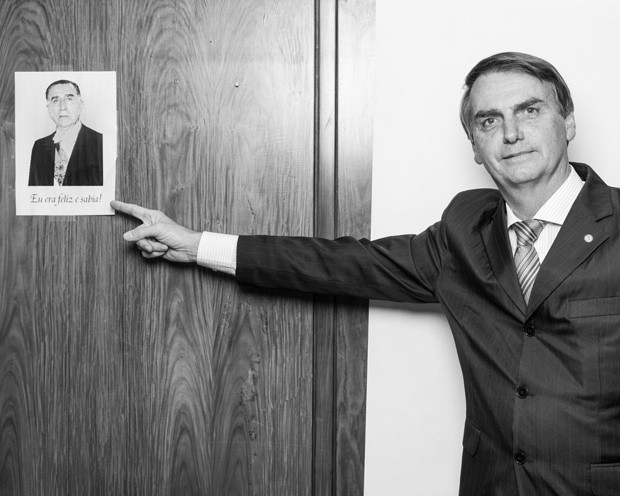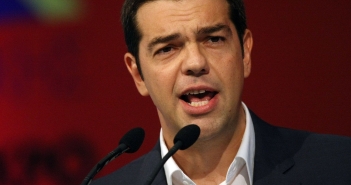The use of xenophobic language by Brazil’s new president, Jair Bolsonaro, known as the ‘Trump of the tropics’, reinforces a dangerous narrative in which refugees and migrants are portrayed as threats to national security, writes humanitarian worker Bruna Kadletz.
FLORIANÓPOLIS, Brazil – In his first official visit to the White House, Brazil’s new Far Right President Jair Bolsonaro, declared his support to president Donald Trump´s dehumanising immigration policies.
Publicly reinforcing dangerous stereotypes of refugees and migrants as threats to national security, cultural heritage and social order he said in an with Fox News on Monday, March 18th: ‘The majority of potential immigrants do not have good intentions or do not intend to do the best or do good for the American people.’1During the same interview Bolsonaro lent support to Trump’s plan to build his infamous wall along the US-Mexico border.
Such remarks are in line with a growing global anti-immigrant trend, treating refugees as unwanted, and referring them to as potential criminals and threats to stability.2
The Populist language of violence and xenophobia promotes the idea that asylum seekers, refugees and vulnerable migrants pollute societies, contaminating social and economic relationships, and that their presence leaves streets dirty. This normalises confinement in exclusion zones, such as refugee camps, detention centres or ships on dangerous voyages.
American author and cultural critic Henry Giroux calls this rhetoric the ‘discourse of pollution.’ In the United States, the Trump administration employs it as a form of dehumanization, enabling ‘policies in which people are relegated outside boundaries of justice and become the driving force for policies of terminal exclusion.’3
The Bolsonaro administration shadows Trump´s moves and employs the same rhetoric from the discourse of pollution. On entering office, his first major move was to pull Brazil out of the United Nations-led Global Compact for Safe Orderly and Regular Migration, adopted by more than 160 countries in December 2018.4‘Not just anyone can come into our home,’ he declared on Twitter. ‘Defending our national sovereignty has been a key part of our campaign and it is now a priority of our government,’ he continued in another tweet.
Bolsonaro’s views on migrants is consistent with a history of xenophobic comments. In a 2015 interview, he referred to Senegalese, Haitian, Syrian and other asylum seekers arriving in Brazil as ‘the scum of the world,’5 implying the country had enough problems already, and that they would even pose a threat to the Brazilian Armed Forces.
On January 6th, he posted a video on his official Facebook page of a Muslim woman being stoned to death. The description underneath reads, ‘Under Sharia law, a woman is stoned to death by many coward Muslims. This is the culture wishing to invade the West and subject us to this aberration.’6
The Brazilian government’s xenophobia and decision to walk away from the migration compact signals dark days of hostility, and stricter border controls.
Refugees and immigrants, seeking protection and better living conditions, are most affected by the discourse of pollution. Instead of having their human rights vindicated, such a point of view increases the vulnerability and fear of refugees and migrants.
Far Right global leaders seem to think their individual online rantings exist in a vacuum, but their words embed belief systems, and legitimates the behaviour of extremists. For a head of State to say migrants do not have good intentions or are scum is highly irresponsible. Leaders should be uniting people with a progressive vision, rather than exploiting existing divisions.
This perverse language informs policies which could lead to further exclusion and vulnerability in places from Brazil to the United States.
Thus, Bolsonaro’s administration poses a threat to refugees’ human rights. If his discourse of pollution brings harsher migration policies, the result could be further xenophobic attacks, hostility and policies of exclusion. That would only accentuate the vulnerability of asylum seekers and refugees in Brazil.
Violent and xenophobic language can lead to violent acts being perpetrated against refugees and migrants. The recent massacre at the two mosques in Christchurch, New Zealand, of fifty people, is just the latest example of White Supremacy and Far Right terrorism, encouraged by a misleading narrative of refugees and migrants as pollutants that need to be cleaned up.
In contrast to others, New Zealand´s Prime Minister, Jacinta Ardern, responded to the massacre with courage and leadership. Her compassionate and caring response is a stark contrast to the angry words of Donald Trump, Jair Bolsanaro and others. Only with the power of love can we move forward as a united global community.
We rely on contributions to keep Cassandra Voices going.




